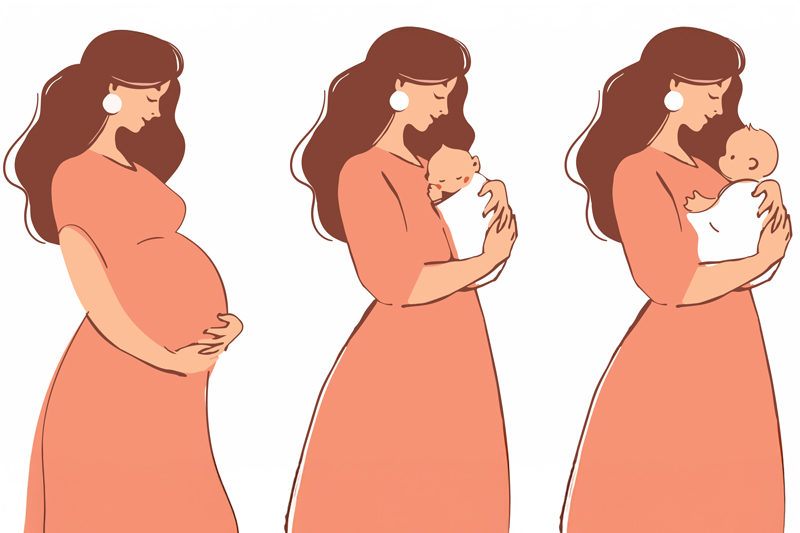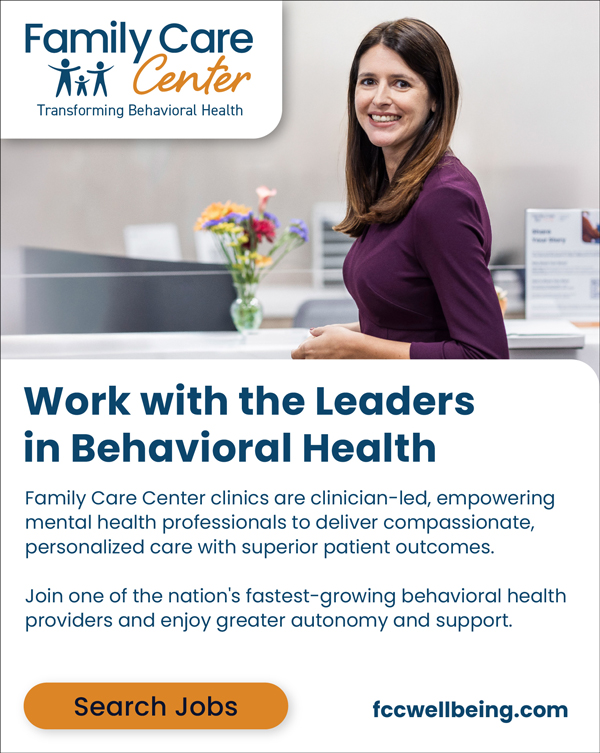One in five mothers is affected by a mental health condition, and 75% of women impacted by maternal mental health conditions remain untreated, increasing the risk of long-term negative impacts on mothers, babies, and families. 1 The effects aren’t just heartbreaking; they’re far-reaching. When a mother is struggling, her well-being and her child’s development can both be at risk.

Yet, when we talk about maternal mental health, the focus is usually limited to the postpartum period. But for many women, the emotional rollercoaster begins long before a baby arrives and continues long after.
Motherhood isn’t a single chapter; it’s a lifelong journey. From trying to conceive to raising children to becoming an empty nester, each stage brings its own challenges. Yet most mental health support is centered on the weeks and months after birth, leaving many women unseen and unsupported.
While postpartum depression and anxiety deserve urgent attention, they’re only part of the picture. A mother’s journey may begin with the stress of infertility, miscarriage, or even the pressure to become a mother. It can continue through the daily demands of parenting, the complex emotions of watching children grow up, and the identity shifts that come after the kids leave home.
It’s time to recognize maternal mental health for what it truly is: a lifelong journey. Each stage brings its own set of challenges, and every phase deserves to be seen, heard, and supported.
Before Motherhood: The Silent Struggles
For many women, mental health challenges connected to motherhood start before the baby is born. Some face pressure to get pregnant by a certain age, especially in their late 20s or 30s. Others wrestle with infertility, pregnancy loss, or the emotional toll of fertility treatments. Those unsure about becoming parents may feel guilt or shame in a culture that values traditional family roles. All of these experiences can trigger anxiety, depression, and deep stress. But because they happen before birth—or even before pregnancy—they’re often overlooked.
Mental health needs during this phase are often complex and deeply personal. Women may need space to grieve a loss, process conflicting emotions, or simply talk through their feelings without judgment. The pressure to make the “right” decision or follow a certain timeline can be isolating, especially when it feels like everyone else is moving forward effortlessly.
Talking to a therapist, joining a support group, or connecting with a provider who understands reproductive and perinatal mental health can help offer meaningful guidance during this time.
Navigating Pregnancy, Childbirth, and Caring for a Baby
Pregnancy is often described as a joyful time, but it can also be deeply overwhelming. Concerns about the baby’s health, fears around childbirth, and intense physical and hormonal changes can leave many women feeling emotionally depleted. For some, pregnancy may worsen pre-existing mental health conditions such as anxiety, OCD, or bipolar disorder.
Even in a healthy pregnancy, the pressure to feel constantly happy can make it difficult to talk about emotional struggles. Many women hesitate to share symptoms of depression or anxiety for fear of being judged—so they stay silent. However, the reality is that maternal depression occurs as frequently during pregnancy as it does during the postpartum period.2
Then, once the baby arrives, new challenges emerge. Hormonal shifts, sleep deprivation, and the demands of caring for a newborn can trigger or intensify mental health symptoms. While the “baby blues” are common and usually resolve within a couple of weeks, more serious conditions—like postpartum depression, anxiety, or intrusive thoughts—often require professional support.
Postpartum depression (PPD) alone affects an estimated 10–20% of new mothers worldwide. Characterized by persistent sadness, hopelessness, and a loss of interest or joy, PPD can begin within the first few weeks after childbirth but may surface anytime within the first year.
What many people don’t realize is that pregnancy-related depression can start as early as conception and persist long after birth. It’s not always talked about, but it should be. No one should suffer in silence. When a woman feels safe to speak up—without shame, fear, or judgment—she’s much more likely to get the help she needs.
Early intervention and a well-rounded care plan can enhance maternal outcomes, strengthen the parent-child bond, and foster a healthier, more resilient family foundation.
Comprehensive care plans that include therapy, medication when appropriate, and targeted mental health interventions—not only support a mother’s mental health but also address psychiatric factors that impact mother-infant bonding and outcomes. More advanced treatments, such as transcranial magnetic stimulation (TMS), are also available when these approaches are ineffective.
Middle Motherhood: The Mental Load of the School-Aged Years
The school-aged or “middle years” bring a different kind of exhaustion—one that’s harder to name and even harder to shake. As children grow, so do their academic, emotional, and social needs. Mothers are not just juggling daily tasks; they are often trying to anticipate them and even head problems off before they happen.
Outside of parenting, this “middle” stage often overlaps with a mother’s peak professional years, which adds pressure to succeed at work while staying fully involved at home. The constant planning, organizing, and worrying can often lead to burnout.
Emotional challenges can also arise. Kids may struggle in school, face friendship troubles, or show early signs of anxiety or depression. For moms—especially those with more than one child—the emotional load can be heavy. They’re not just holding it together for themselves but for everyone else, too.
Mental health support during this phase isn’t just about surviving the chaos. It’s about setting boundaries, sharing the load, and rediscovering joy outside of motherhood. Therapy can be especially helpful in this stage—offering a space to process stress, reflect on identity, and develop strategies for both parenting and self-preservation. Support should include not only tools for managing daily demands but also room to reconnect with the parts of yourself that existed long before motherhood.
The Kids are Grown. Now What?
Becoming an empty nester is another significant life shift. After years of putting children first, their departure can feel both like a proud milestone and a profound loss. Even when expected, this change can stir up grief, loneliness, and a sense of lost identity.
Every woman experiences this stage differently. Some feel free to rediscover themselves, while others are caught off guard by sadness or anxiety. Milestones such as graduations or weddings can bring joy and a quiet ache of being left behind.
This time often overlaps with other challenges. Many women are caring for aging parents and managing their own health changes. Menopause, with its hormonal fluctuations and physical symptoms, can add another layer to the emotional load—exacerbating mood changes, sleep issues, or feelings of vulnerability. Taken together, these transitions can feel overwhelming, even for women who once considered themselves emotionally resilient.
But this stage also offers room for rediscovery. After years of tending to others’ needs, it can become a season of reflection, reconnection, and growth. Therapy can help process grief, manage anxiety, and reframe identity with clarity and confidence. Relationship counseling may deepen bonds with partners, navigate changing dynamics with adult children, or foster new friendships. With the right support, women aren’t just getting through this season—they’re growing into it and thriving.
Breaking the Silence: Every Mother Deserves Ongoing Support
Too often, mothers quietly carry their emotional burdens. Guilt, stigma, and deeply ingrained generational beliefs teach women to push through pain, prioritize others, and equate strength with silence. Mental health concerns may be brushed aside as “just part of the job” or dismissed entirely until they reach a breaking point. This silence can be isolating, as many mothers feel alone in their struggles—even though their experiences are deeply shared.
But maternal mental health isn’t just about responding to a crisis. It’s about creating space to grow, process, ask hard questions, and rediscover joy. Whether a woman is grappling with infertility, balancing the demands of parenting and career, or redefining herself in an empty home, her emotional needs are real and deserving of care. At every stage of a woman’s life, accessing appropriate mental health services should be a priority—whether through therapy, medication, TMS, or other psychiatric interventions—regardless of the stage of motherhood a woman finds herself.
As society expands its understanding of mental health, it’s essential to broaden the conversation beyond the postpartum window. The maternal journey doesn’t begin or end with a baby—it evolves over time, shaped by love, loss, change, and resilience. And at every stage, women deserve the support, validation, and resources that help them not just survive but thrive.
Libby Erickson, DO, is a Psychiatrist at Family Care Center.
Sources
1. Byatt, N., Levin, L. L., Ziedonis, D., Moore Simas, T. A., & Allison, J. (2015). Enhancing Participation in Depression Care in Outpatient Perinatal Care Settings: A Systematic Review. Obstetrics and Gynecology, 126(5), 1048–1058. https://doi.org/10.1097/AOG.0000000000001067
2. Pearson, R. M., Carnegie, R. E., Cree, C., Rollings, C., Rena-Jones, L., Evans, J., Stein, A., Tilling, K., Lewcock, M., & Lawlor, D. A. (2018). Prevalence of Prenatal Depression Symptoms Among 2 Generations of Pregnant Mothers: The Avon Longitudinal Study of Parents and Children. JAMA Network Open, 1(3), e180725. https://doi.org/10.1001/jamanetworkopen.2018.0725








